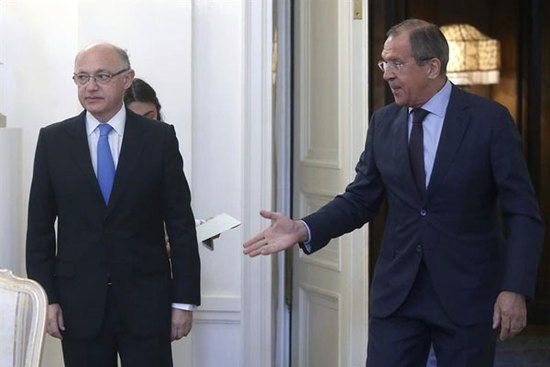
Argentina’s Foreign Minister Hector Timerman (left) in Moscow
The small group of academics and foreign policy observers that care and write about the BRICS acronym has been in uproar for the past weeks. The reason is a rumor that Argentina – an economic basket case that will soon be overtaken by Colombia as South America’s second-biggest economy – would join the BRICS grouping. After India’s Ambassador to Argentina made a somewhat ambiguous remark at a conference in Buenos Aires, several minor news sources picked up the theme and wondered whether the 6th BRICS Summit in Fortaleza would see Argentina’s accession.
It helped little that Argentina’s Foreign Minister Hector Timerman visited Moscow in the following week, and that the Russian government expressed its interest in having Argentina participate in the upcoming shindig. In his daily press briefing, Cabinet Chief Jorge Capitanich referred to the Russian invitation to Argentina to attend a summit of the so called BRICS countries next month in Brazil and said it “leads the way towards [Argentina’s] effective participation” in the bloc.
The entire debate provides several insights. First, the lack of the BRICS grouping’s clear agenda and communication to the public is so pervasive that commentators and journalists who seek to write about the outfit often pick up irrelevant information. Similar discussions – about the accession of countries like Indonesia, Turkey, South Korea and Nigeria – have regularly surfaced over the past years. Of all these, Argentina’s accession is by far the most absurd proposal, given the country’s dysfunctional economy and counterproductive policies over the past years. As a consequence, after the talks with Timerman, Foreign Minister Lavrov pointed out that “so far, no ideas have been voiced about planning further expansion”.
Secondly, the discussion about economic growth does not capture what the BRICS grouping today is about. While the creation of the acronym was indeed based on growth projections, this element no longer proved to be decisive when the group’s leaders decided to invite South Africa in late 2010. At the time, other economies – such as Indonesia and Nigeria – were already growing much faster.
The defining element of the BRICS grouping is often overlooked: All four initial member countries (and South Africa as well, to some degree) have global ambitions – a global project, however well or ill-defined, voiced frequently at different global fora. It is here that the BRICS grouping is indeed a useful political category – for example, there are no emerging powers outside of it that have a systematic engagement with the UN Security Council, either as permanent members or committed candidates. It is in this aspect that Argentina most obviously differs: There is no sustained notion among policy makers in Buenos Aires that Argentina should be a permanent member of the Security Council, nor does Argentina regard itself as is a crucial element in the restructuring of global order.
Finally, the debate – however brief and inconsequential – shows the continued attractiveness of the BRICS label, even though some of its members – such as South Africa- are now facing an acute risk of entering recession.
Photo credit: The Nation
Read also:
Why the BRICS should forget Jim O’Neill
South Africa’s BRICS membership: A win-win situation?
Brazil’s Hesitant BRICS Summit Preparation // http://www.brics6.com.br Still Offline








